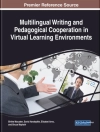Creative Spaces for Qualitative Researching: Living Research. This book looks inward at researchers who are seeking to live their research – to embody the principles, methodologies and ethical conduct that comprises their research strategies. And, it looks outward at the living world as the focus of qualitative research. From both perspectives the editors and authors of this book have created spaces for qualitative research that provide critical and creative frameworks for conducting and living their research. A rich variety of research voices and lives are illuminated, liberated and revealed in the book. There are five sections in the book: Researching Living Practices Doing Creative Research Being a Creative Researcher Co-Creating Qualitative Research in Creative Spaces Becoming Transformed Through Creative Research.
Tabela de Conteúdo
Series Introduction; Foreword; Section 1: Researching Living Practices; 1. Researching Living Practices: Trends in Creative Qualitative Research; 2. Researching in Wicked Practice Spaces: Artistry as a Way of Researching the Unknown in Practice; 3. Creating Spaces to Bring Research into Living Practice; Section 2: Doing Creative Research; 4. Creative Research Landscapes and Gardens: Reviewing Options and Opportunities; 5. Boundary Riding and Shaping Research Spaces; 6. Developing Critical Reflection as a Research Method; 7. Bringing Merleau Ponty’s Inspirations to the Doing of Research; 8. Embodiment in Research Practices: The Body in Qualitative Research; 9. Creative and Visual Methods to Facilitate Reflection and Learning Through Research; 10. Creative Research Re-Presentations; 11. Re-Inscribing Gender into the Heritage of OT in Australia: “The Sock Knitter”; 12. Envisioning Visual Research Strategies; 13. Photoelicitation Interview Methods and Research with Children: Possibilities, Pitfalls and Ethical Considerations; 14. The Gendered Battlefield: Creating Feminist Spaces in Military Places; Section 3: Being a Creative Researcher; 15. Living Research Practices: Being in Creative Spaces; 16. Being Me: In Search of Authenticity; 17. Learning to be a Researcher: Bridging the Gap between Research and Creativity; 18. Embodying Creative Imagination and Expression in Qualitative Research; 19. Liberating Research Mentoring: Reflecting, Re-Visioning, Re-Creating; 20. Living Ethical Practice in Qualitative Research; Section 4: Co-Creating Qualitative Research in Creative Spaces; 21. Collaborative Inquiry: Reciprocity and Authenticity; 22. Innovative Ways of Analysing Data with Practitioners as Co-Researchers: Dancing Outside the Ballroom; 23. Telling People’s Stories: Creating Authentic Approaches; 24. Playing Creative Edges: Reflections from “Women Out to Lunch” 5 Years on; 25. Creative Partnerships in Research Degree Programs: Towards Collaborative Realisations; 26. Inclusive Participatory Action Research: Rights, Camera, Action!; Section 5: Becoming Transformed Through Creative Research; 27. Our Journeys of Becoming Authentic Researchers: Becoming Transformed though Critical Creative Research; 28. From Practice to Research and Back Again: Living Transformations; 29. Journeys of Meaning Making: Through Transformation, Illumination, Shared Action and Liberation; Contributors












